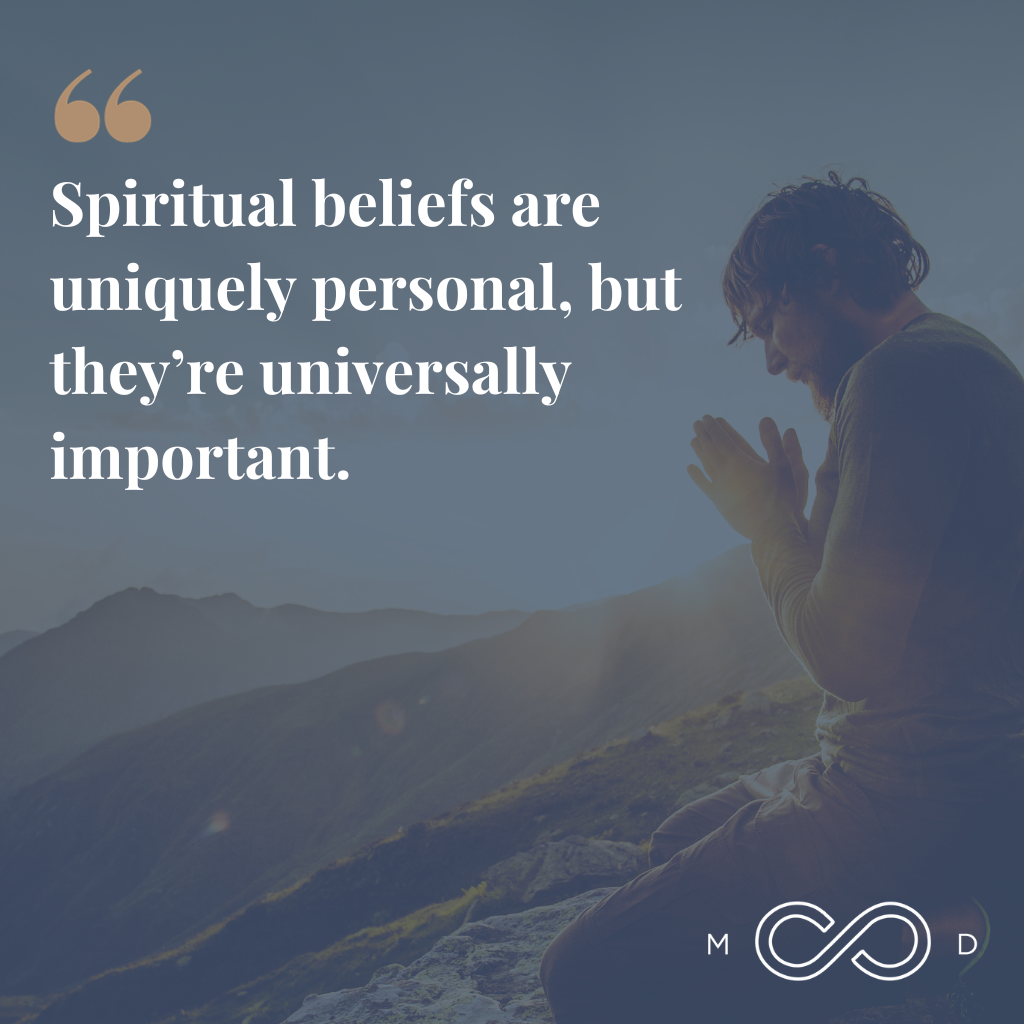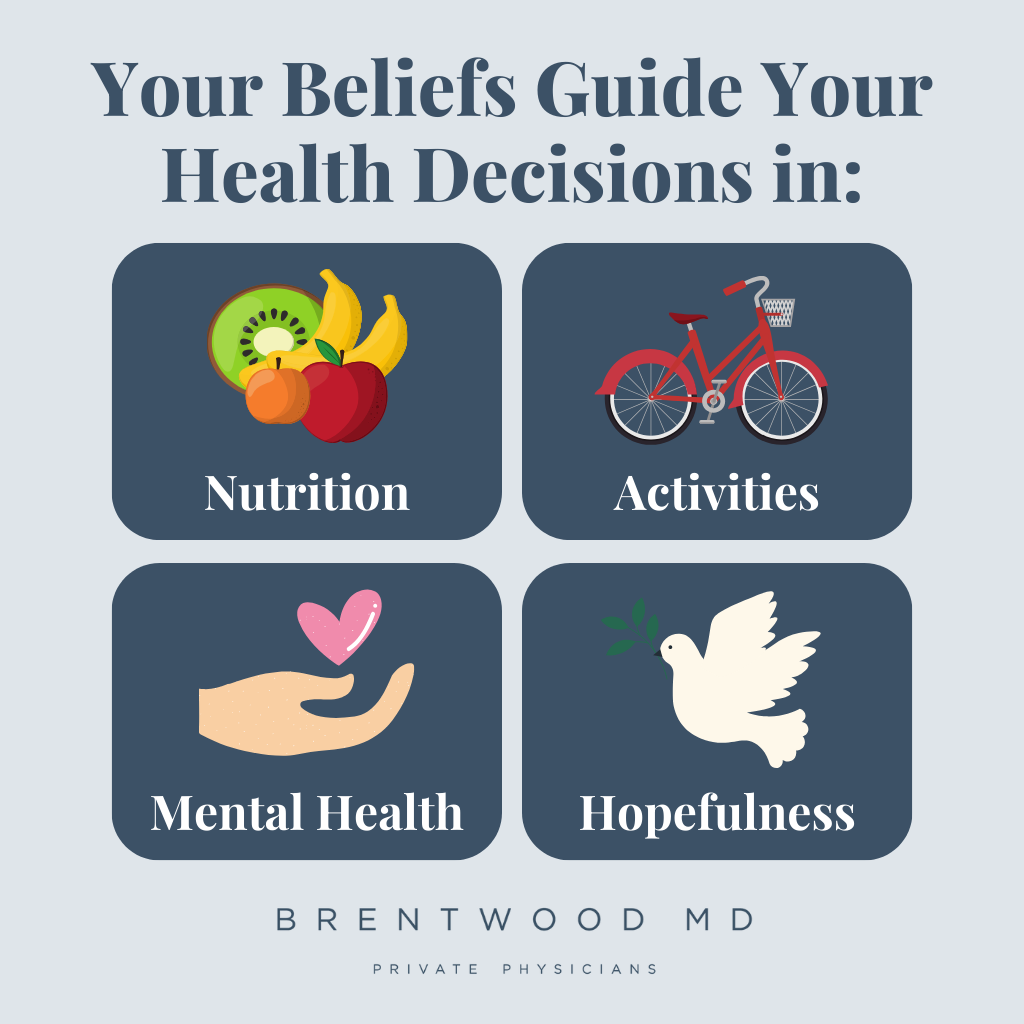It’s not uncommon for members to ponder their purpose in my exam room.
Surprised? When you consider it, many are at a stage of life where — in baseball speak — they’re rounding second, heading to third, and hoping to get home.
At the midlife stage and beyond, people often question their life’s purpose. And I’ve found that the answers they come up with are often rooted in their spiritual beliefs.
So, I discuss spirituality with my patients. Why? Because it’s intimately linked to health.
Spirituality Centers on Four Core Areas
At its core, spirituality is about your role and purpose in the world and how you connect to that purpose. Much of the time, there’s a religious component, though people can be “spiritual” without being religious.
Whether you’re entering midlife, reaching the twilight of your career, or embracing retirement, you’re probably taking stock and thinking about:
- The meaning of what you’ve done so far
- Whether you’ve made a significant contribution to those around you
- What you want the last half or quarter of your life to be defined by
When I say “spiritually” here, I mean an individual’s connection with one or more of four core areas:
- Self
- Community
- Nature
- A higher power
Different belief systems assign more weight to one area or another, as do different individuals. Some may feel most alive in the great outdoors. Others are energized by serving those less fortunate. Some may feel refreshed during a time of meditation alone in one’s thoughts. Regardless, these experiences can bring that indescribable, intangible feeling of spiritual awakening.
Spirituality’s Connection to Health
Unfortunately, the medical community tends to overlook spirituality as a cornerstone of health. Considering how subjective and varied each person’s unique beliefs are, perhaps that’s not surprising. But the connection between health and spirituality is impossible to deny.
With appropriate perspective, one can see the effects that spiritual beliefs have had on their past and present health. And, of course, these beliefs are also powerful influences on a person’s future health trajectory.
For this reason, I talk a lot with my patients about their purpose. It might be, Why are you an attorney? or, What has been your greatest achievement? That articulated purpose often identifies a source of motivation, a spark that gets someone out of bed each day. These responses help inform our strategy to optimize health. It helps answer questions like, Why take care of myself in the first place? and, How can I make a change to optimize my health? We find motivation within our own purpose.
Your Beliefs Guide Your Health Decisions
I encourage my patients to think about their spiritual beliefs and how these influence their nutrition, activities, mental health, and connection to hope. By tapping into their spiritual beliefs, patients ensure that their decisions in these four areas are congruent with their purpose.
Nutrition
If you think about it, how you fuel your body is crucial to living out your purpose. If you believe in a higher power, you might consider how your body was created to function and how the types of foods you eat are key to encouraging your body to function correctly and appropriately. You don’t put diesel fuel in an electric car — it’s not how that car was created to run.
If you draw your spirituality from nature, you might think about how your food is sourced. Are you consuming mostly whole foods or artificial foods with highly processed ingredients? Are you feeding your body in a way that supports spending time in nature? Finally, are you eating mindfully? This can be a spiritual practice in itself.
Activities
How do you move your body? How are you using it? Whether you believe in creation, evolution, or something in between, you recognize that our bodies have gotten to this point in history for a reason. You see that the human body exists for a certain level of physical function.
Acknowledging what our bodies are capable of guides our decisions about how we use our bodies. For example, we incur a lot of health-related challenges when we don’t honor the fact that our bodies are built to move. Metabolic diseases such as diabetes and inflammatory processes like arthritis thrive when we are sedentary.
You might not eat well or exercise if you think your health affects only you. But when you tap into spirituality, you realize, “There’s something greater than me at work here.” Self care isn’t selfish; it’s a spiritual practice.
Mental Health
The mind-body connection isn’t linear; rather, it’s an evolving circle. Honoring this connection can help you address some of the mental processes that encourage positive momentum in your health journey.
When feelings of depression or anxiety set in, you can focus on spiritual beliefs and practice gratitude. As we’ve noted previously, gratitude and anxiety can’t coexist in the mind.
Hopefulness
“For those who have hope, it may help some to live longer, and it will help all to live better.” —Dr. Jerome Groopman, The Anatomy of Hope
I love this quote. It’s a reminder of the power of positive thinking.
Hopefulness is necessary for the betterment of health and for dealing with health challenges. Having things to look forward to is comforting and encouraging. It can be a great motivator for our daily actions, whether it’s the hope of reaching a goal, the hope of overcoming adversity, or the hope of the eternal.
Final Thoughts
Spiritual beliefs are uniquely personal, but they’re universally important. Your beliefs inform how you feed your body, how you move your body, how you nurture your mental health, and how you find hope — all components of your physical and emotional well-being.
I encourage you to discuss your beliefs with a trusted doctor. Sharing them can help you unlock your higher purpose, which will ultimately propel you to make positive health decisions.

Dr. Wright joined Brentwood MD in 2022 as the model allows him to spend more time connecting with patients and build a foundation of exceptional care. He is a Nashville native and completed his family medicine residency at the University of Tennessee Health Science Center, where he also served as Chief Resident. He believes that your health deserves a prominent position on your priority list, and would be honored to serve you and your family.








